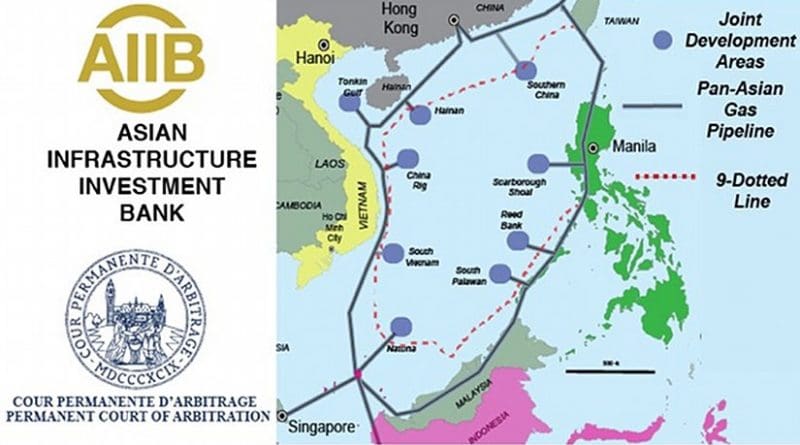Will UN Tribunal Ruling Disrupt AIIB Annual Meeting? – Analysis
Could a United Nations’ South China Sea tribunal ruling wreak havoc upon the Asian Infrastructure Investment Bank (AIIB)’s official coming out party?
Any time now, the UN Permanent Court of Arbitration could hand down a decision on the Philippines’ appeal against China’s territorial claims to virtually the entire South China Sea.
Meanwhile, the newly-created AIIB holds its inaugural annual meeting June 25-26 in Beijing. Beijing has invested immense national prestige in the new bank.
The tribunal’s decision will almost certainly test China’s political finesse. That’s because China has repeatedly said it won’t accept a UN ruling that goes against it.
The problem there is that the AIIB’s success may hinge on how it navigates its way through tricky political issues such as the South China Sea.
This uncertainty is creating disquiet about China’s commitment to multilateralism — of which the newly-minted AIIB is intended to be a China’s commercial symbol.
To date, the six-month old AIIB has been at pains to portray itself as a new multilateral economic institution governed by written rules and not merely a politically-manipulable foreign economic policy puppet of China.
To get a better idea of China’s looming political-economic conflict here, consider the AIIB’s Articles of Agreement.
In them, the AIIB pledges it will ‘not take a position on territorial claims’ (Article 13, paragraph 4), and that for projects in disputed areas ‘member consent is obtained,’ (Article 13, paragraph 4) and that it will ‘not undertake financing in the territory of a member if the member objects,’ (Article 13, paragraph 3).
The bank further promises that ‘only economic considerations shall be relevant’ (Article 31, paragraph 2) and that it ‘shall not interfere in the political affairs of any member, nor shall they be influenced in their decisions by the political character of the member concerned.’
All of this matters because deeply-needed infrastructure investment in Southeast Asia — particularly offshore infrastructure — is likely to require interconnection though territorially disputed areas.
Naturally, early infrastructure projects funded by the AIIB in Southeast Asia will likely be things like roadways, rail and airports exclusively with single national borders. But Asia’s real need is for cross border infrastructure — particularly for energy and especially offshore.
Of this latter class, the 10-member Association of Southeast Asian Nations (ASEAN) has developed two highly promising projects.
These are the Trans-ASEAN Gas Pipeline (TAGP) and the Trans-ASEAN Electricity Grid (TAEG). Both are aimed at more deeply interconnecting the energy economies of ASEAN’s states, including across the South China Sea to Indonesian Natuna, Malaysian Borneo and the Philippines.
The TAGP and TAEG projects were first devised nearly a decade ago. The estimated cost of both is $13 billion. Together, they offer an ideal opportunity for the AIIB to make a dramatic entrance onto the global infrastructure investment stage.
The problem, however is that the projects could find themselves subject to territorial claims on terms set by China’s Communist Party, not the AIIB’s Articles of Agreement.
This puts the AIIB in a very sticky position if — as expected — the UN Panel in the Hague rules China’s Nine-Dotted Line ambit claim to the entire South China Sea incompatible with international law.
In that case, the AIIB would need to declare which comes first in its deliberations: its own Articles of Agreement or the edicts of the Communist Party.
For the AIIB’s other shareholders, two strategies look possible in a case like this. One’s aggressive, the other cautiously promising.
The first would be to force demonstration votes among AIIB shareholders that China could overrule by veto, but at a political cost to China.That’s an unattractive outcome all around.
The second would be to encourage agreement between China and her Southeast Asian neighbors on Joint Development Areas (JDAs) in the South China Sea.
All sides in the South China Sea pay lip service to ‘joint development’ of offshore oil and gas in disputed areas. The problem is that interpretations differ on the definition of ‘joint development.’
But at its most reductive it means cooperating to develop resources in disputed areas while indefinitely postponing final settlement of disputed claims.
Based upon that understanding, the AIIB could fund construction of the TAGP to increase cross-border gas flows between ASEAN nations and China. All sides benefit.
This, in turn, would open the way for bilateral agreements (Philippines-China, Vietnam-China, for instance) to be negotiated on joint development of disputed area oil and gas fields (around Reed Bank and Triton Island, for instance). These could then be delivered to market through the TAGP gas delivery infrastructure.
Later, other JDAs could be established, such as in the Tonkin Gulf, Scarborough Shoal and Natuna Island.
These in turn could then be connected to each other and to downstream regional markets through AIIB-funded infrastructure.
JDAs and cross border energy infrastructure have pedigree elsewhere in the world. Highly-successful JDAs exist in the Middle East, the Caribbean and the Gulf of Thailand.
And highly-successful cross border energy infrastructure projects have been completed in the North Sea, the Gulf States in the Middle East and elsewhere.
As China emerges on the world stage, the AIIB emerges as a new financial institution and Asia emerges as the world’s largest regional bloc, the ideas above offer a constructive pathway to avoid war over rocks and reefs in the South China Sea that could escalate into something larger.
JDAs enable all sides the ability to claim victory. China can say it’s not climbing down on its 9-dotted line but is dealing with territorial claims bilaterally. The rest of the world can claim China has backed down. Everybody wins
In 20 years, no one will care. At that point, all sides will say they prevailed. And they will have. Collectively.
Grenatec will cover other elements of this idea in coming columns.

